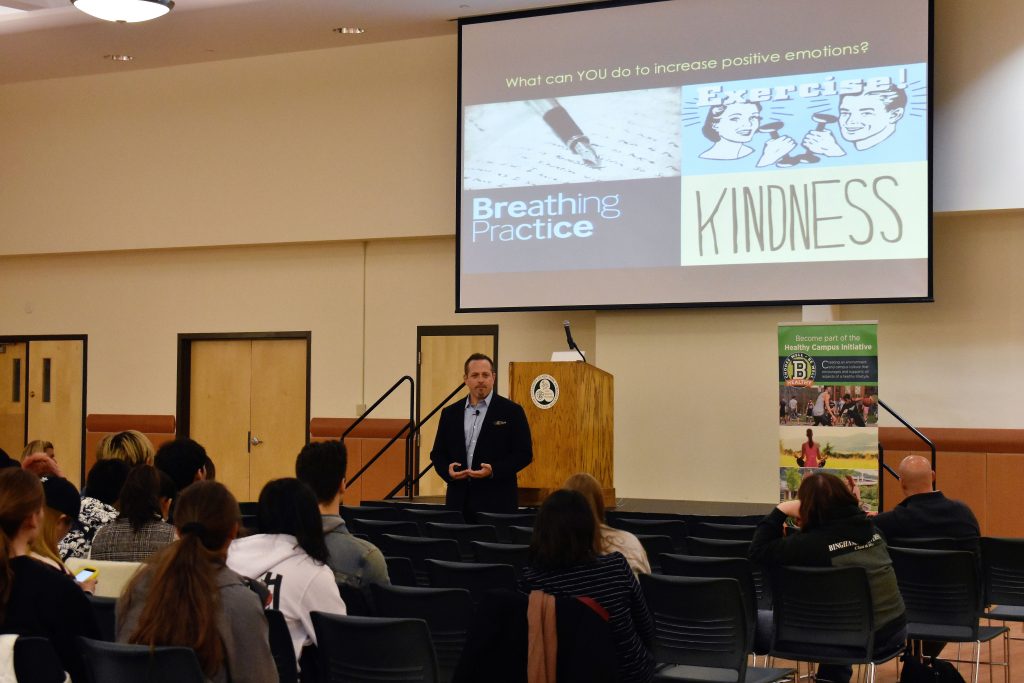
Walk in almost any building on campus, and there they are ― those little green signs. Located next to water fountains and near the doorways, encouraging students to “B-Healthy.”
The signs are part of the Healthy Campus Initiative (HCI), a campaign first envisioned by Binghamton University President Harvey Stenger’s creative activities and research Road Map team, which aims to develop wellness programs and policies that enhance the college experience. Since the implementation of the HCI, the University has been ranked in The 26 Healthiest Colleges in the U.S. by Greatist.
The motivation behind these healthy steps were emphasized at the second annual Healthy Campus Summit, held from 9 a.m. to 4 p.m. in the University Union on Wednesday. The events included several talks on healthy living in school and at the workplace, stretch breaks and other informational sessions. To kick off the full-day event, Stenger addressed the audience, stressing the importance of teaching students how to live happy and healthy lives during their time at BU.
“If we can’t give students the life skills to be healthy for the rest of their lives, then we probably have failed in our mission to make great citizens in the future,” Stenger said.
According to Gina Baglieri, a graduate assistant for the HCI and a first-year graduate student studying biological anthropology, the summit is useful in providing students various ways to stay happy and healthy.
“It’s important to showcase all the different aspects of wellness,” Baglieri said. “[HCI] gives people an opportunity to really start looking at their lives to see how they can implement wellness in a way that suits them.”
According to Laura Cichostepski, the assistant director of marketing for Campus Recreation, the University was one of the first dozen schools to participate in Partnership For A Healthier America, a nonprofit that aims to reduce childhood obesity in the United States. She said the summit is a “pulse check” on the University’s progress toward becoming one of the healthiest universities in the country, while also promoting the resources available to the campus community.
Some of the University’s most recent improvements include the newly redesigned Bike Share program, the Plus1 initiative launched by Binghamton University Dining Services and training faculty from 40 percent of all University departments to be “healthy campus liaisons.”
The day included keynote addresses from Michael Finkelstein, a holistic doctor and an adjunct professor at the University, and David Lerner, clinical instructor at New York University. Both speakers emphasized the importance of happiness in daily life, and said it benefits the individual and the institution.
Finkelstein’s presentation, “The Evolving Landscape of Higher Education: Considerations for the Impact on Personal and Institutional Success,” focused on the way in which a teacher’s passion to teach can positively affect their relationships with students as well as their own health.
“I see the role of a teacher as humanitarian, to contribute to the evolution of consciousness of humanity,” Finkelstein said. “Similarly, I want to suggest that when teachers embrace that role, not only are they better teachers but also healthier human beings themselves.”
Finkelstein said there’s something special about BU’s commitment to healthy living.
“I feel really good about what’s going on here, because an initiative like this, to me, is a reflection of how much this university cares about the subject of well-being,” Finkelstein said. “And to be able to contribute to that, is sort of the purpose of my life.”
Julia Mashall, a sophomore studying psychology, said she enjoyed Lerner’s presentation for his engagement and influential ideas.
“I thought he was an amazing speaker and the stories he told through other people were relatable,” Mashall said. “I thought he gave really good advice about how to change your mindset.”


